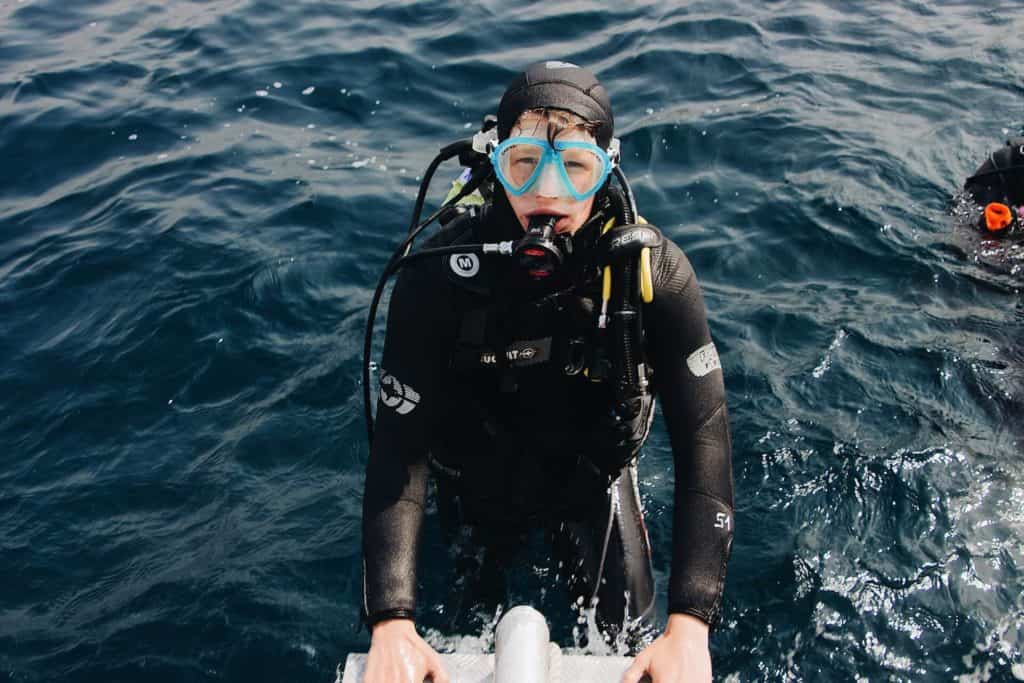Disclaimer: This page may contain affiliate links and I may get a small commission if you decide to make a purchase through my links, at no additional cost to you. Thank you!
So you have just got your scuba diving certification; hurray!
It feels surreal, isn’t it, that you have finally done it?
But then you started to feel worried and anxious about your capability as a newbie scuba diver.
Or wondering what scuba gears to get for the first dive.
You might also start to have all sorts of imaginations of things that could possibly go wrong as you dive.
What if this? What if that? And the list goes on and on.
Well, you can alleviate your anxiousness and have a safe dive by going through your scuba diving notes and learning the essential scuba diving tips for beginners.
And guess what?
This detailed article will show you the top 33 crucial scuba diving beginner tips that you can easily implement so that you will have a fun, memorable and most importantly emerge unscathed from your first dive.
Let’s get into it!
Scuba Diving Tips For First Time
- Get Your Scuba Diving Certification From Certified Centre
- Listen To Dive Briefing
- Ask Questions
- Familiarise Yourself With Being In The Water
- Ensure You Are Fit to Dive
- Get Yourself Scuba Diving and Travel Insurances
- Bring Along A Dry Bag
- Rent The Diving Gears First
- Look For Reference Points
- Tie Your Long Hair Neatly
- Go Scuba Diving In A Small Group
- Take Seasickness Pill
- Skip Alcoholic Drinks
- Keep Hydrated
- Use A Menstrual Cup When Having Menstruation
- Do Pre-Dive Gear Check
- Never Hold Your Breath When Diving
- Learn To Clear Your Ears
- Be Alert Of Your Guide and Buddy Whereabout
- Take Note Of Your Air Gauge
- Don’t Dive Over Limits
- Wear Reef-Friendly Sunscreen
- Be Careful Of Marine Creatures
- Reduce Air Consumption
- Stay Calm and Relax
- Don’t Compare With Others
- Don’t Over Exert Yourself
- Ascend Slowly From The Dive
- Debrief With The Guide and Buddy
- Inform Others If You Are Not Feeling Well
- Keep A Dive Log
- Take Great Care Of Your Diving Gear
- Wait For At Least 24 Hours Before Flying
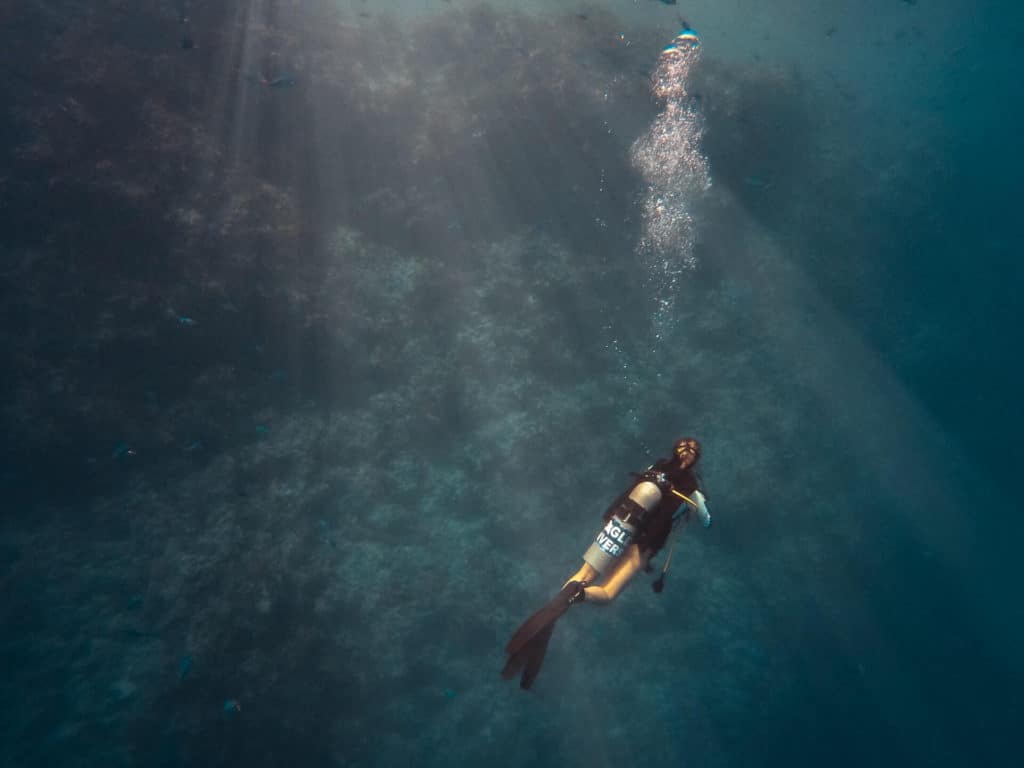
1. Get Your Scuba Diving Certification From Certified Centre
First off, make sure to get your scuba diving certification from a certified dive centre.
Some of the credible ones include PADI, SSI, and NAUI.
By learning from the professionals, you will have peace of mind knowing that the skills and diving knowledge are up-to-standard and potentially life-saving.
2. Pay Attention To Dive Briefing
Different dive sites have different characteristics, ranging from water temperature, water condition, visibility, and so much more.
Therefore, you must listen carefully to your dive master during the briefing. With that, you can take extra precautions on the aspects highlighted by the instructor to have an enjoyable dive session.
3. Have Questions? Shoot Away!
If you have any questions about the diving site, diving buddy, or anything about your first diving trip, shoot away to your instructors.
It is normal to have doubts or questions about this outdoor activity even after you have gotten your diving certification.
So don’t be shy and feel embarrassed if you have diving questions. Remember this golden scuba diving tip for first time: No question is too silly to ask!
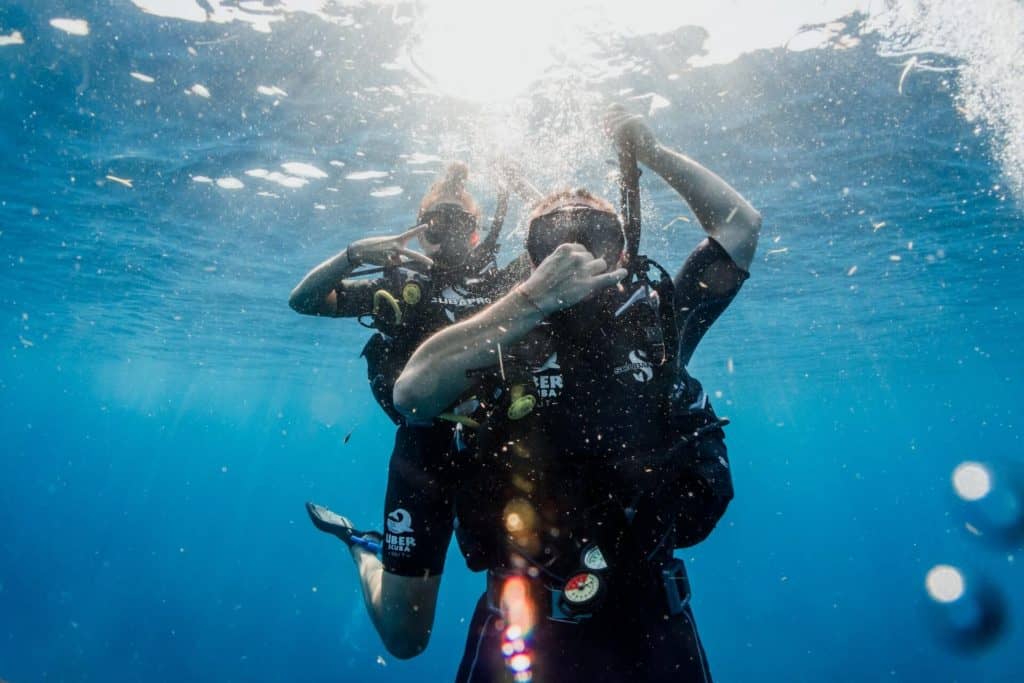
4. Familiarise Yourself With Being In The Water
As you might have already known, diving requires one to be underwater for a period.
If you are not really a big fan of water or experienced some unfavourable moments, then you need to familiarise yourself with being in the water.
Start by spending time swimming in the pool and expose yourself to the aquatic environment.
For additional confidence, ask your diving buddy or friends to join your pool swimming session.
5. Ensure You Are Fit to Dive
You will need to stay focused and alert while diving because unexpected things can happen at times under the water.
For example, the water condition might suddenly turn ugly or unsuspected marine animals pop out of nowhere.
So make sure that you are fit and healthy enough before scuba diving for the first time or kickstart any diving session.
6. Get Yourself Scuba Diving and Travel Insurances
Though you will be surrounded by experienced instructors when diving, the possibility of unfortunate diving incidents happening is there.
So you may want to get yourself covered with diving insurance in case an injury occurs.
Get your insurance quote from World Nomad today!
Disclaimer: World Nomads provides travel insurance for travelers in over 100 countries. As an affiliate, we receive a fee when you get a quote from World Nomads using this link. We do not represent World Nomads. This is information only and not a recommendation to buy travel insurance.
Tip: Different scuba diving insurance might covers differently. So check with the insurance provider first before purchase the policy.
7. Bring Along A Dry Bag
Probably one of the most useful scuba diving tips for beginners is to bring along a dry bag.
No matter if you are going by boat or kayak for scuba diving, chances are water can splash onto your vehicle and make everything wet.
And you wouldn’t want that to happen to your extra pair of clean clothing or that four-figured smartphone.
So to make sure all your important belongings dry at all times, you can keep them in a dry bag.

Aside from being light, it is also easy to clean the dry bag after being used and you can reuse the bag as many times as you want.
8. Rent The Diving Gears First
I know you might be excited to get your own diving gears after getting your certification.
You might even go ahead and plan diving trips for the next 10 years with your newly-known diving buddy.
My advice: Hold that thought right there.
Well, that’s because the excitement can wear off after the first few dive sessions.
Or maybe your health condition doesn’t allow you to dive anymore.
And not to mention getting your own diving gears can cost you at least several hundred.
Most of the dive stores offer gear rental, so you can easily rent one without spending a large amount on the gears.
And if you think scuba diving is here to stay in your life, it will still not be too late to buy the gears that you can call your own.
For starters, you can get your personal mask and snorkel, fins, and mouthpiece.
Some scuba companies offer reusable mouthpieces. If the thought of sharing the same mouthpiece with countless divers gives you the chill, consider bringing your own diving mouthpiece.

9. Look For Reference Points
Just right before you dive into the water, it is best to look for reference points of the nearby landmark.
In the case where you get separated far away from the diving group and boat, you can still make your way back to the shore based on the reference points.
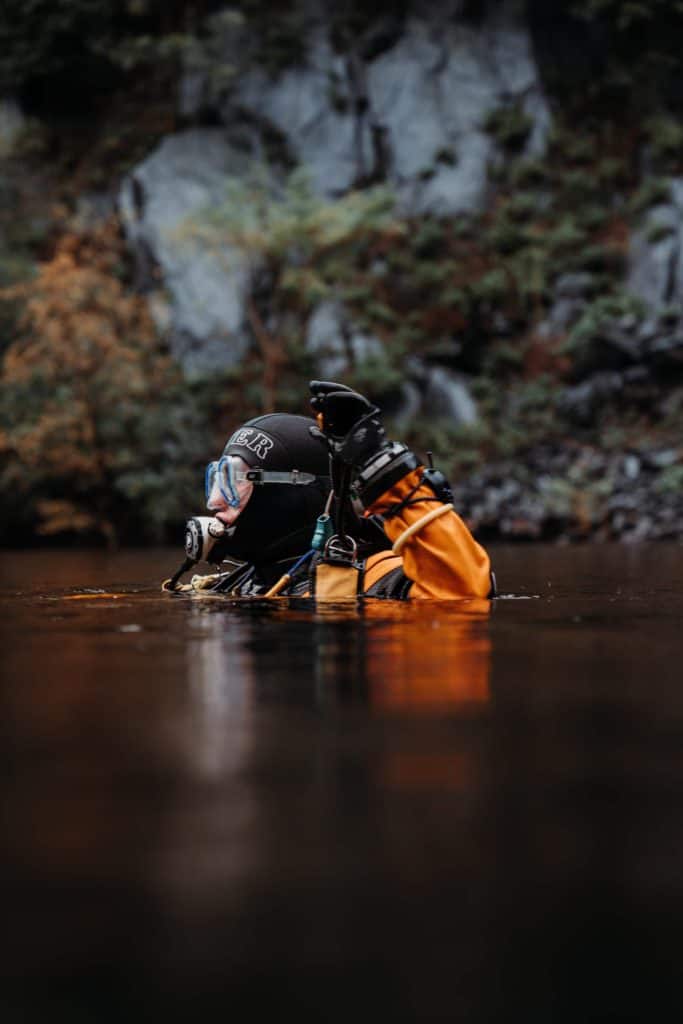
10. Tie Your Long Hair Neatly
Another scuba diving beginner tip that you can follow is to tie your long hair neatly.
You wouldn’t want to spend time unknotting the tangled hair after diving.
Some of the best hairstyles to opt for when scuba diving is the bun, braided pigtails, and French braid.
Alternatively, consider investing in a quality scuba hood to keep your hair in place.
11. Go Scuba Diving In A Small Group
If you have a choice to make, opt for a scuba diving trip in a small group.
With that, the diving instructor can manage better and pay more attention to small participant groups throughout the session.
12. Take Seasickness Pill
If you are prone to seasickness, pop a pill or two right before you board the boat to the diving site.
Or risk vomiting into the plastic bag and lying aimlessly on the boat instead of having fun exploring the site.
Better be safe than sorry!
Other seasickness-relieving methods that you can try include (pill-popping loathers, this is for you!):
- Wear an acupressure wristband or Reliefband
- Eat anti-nausea ginger gum
- Applying motion sickness oil behind ear lobes

13. Skip Alcoholic Drinks
The next drink-related tip is also one of the important scuba diving beginner tips to follow.
Before you go on with your diving session, it is recommended to skip the Mai Tais, mojitos, or any other alcoholic drinks.
Apart from preventing dehydration, it is important to have a clear, sober mind to navigate around the underwater world safely.
14. Keep Hydrated
Diving is a strenuous outdoor activity. Your body will still be sweating and losing water while gliding around.
So make sure to drink more water before and after the diving session to stay hydrated and alert and prevent muscle cramps.
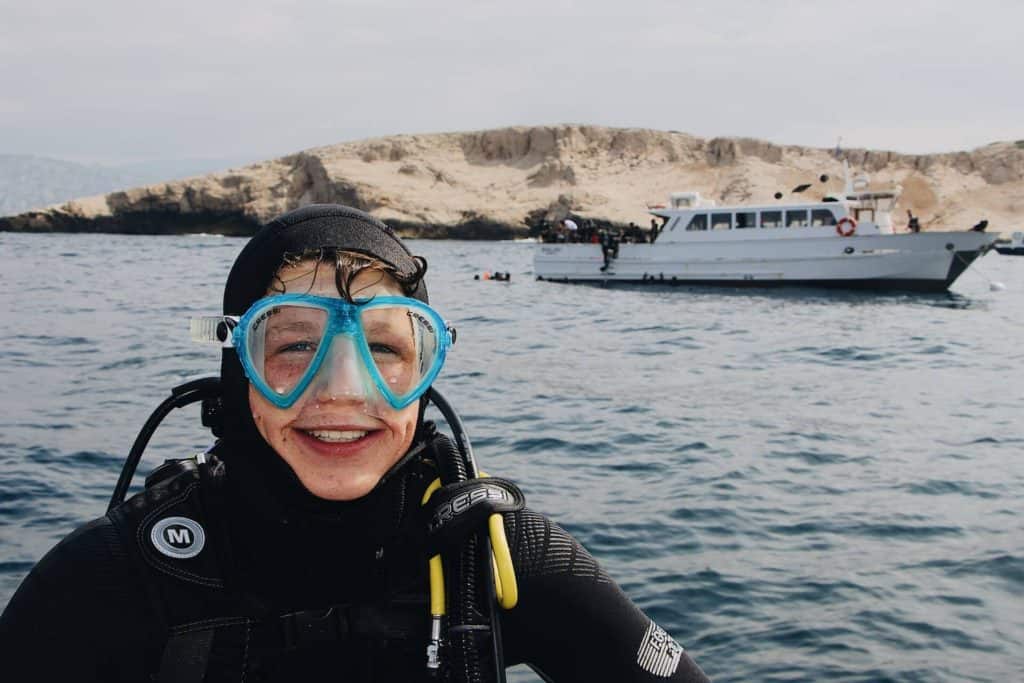
15. Use A Menstrual Cup When Having Menstruation
To all the ladies, rejoice.
Having a period is no longer an excuse to say no to your first dive trip thanks to this awesome invention; the menstrual cup!
Apart from being more convenient, you can bid farewell to the tampon changing routine or worry about its string hanging out of the wetsuit.
Check out this helpful video below on how to use the menstrual cup:
16. Do Pre-Dive Gear Check
Perhaps one of the crucial scuba diving tips for beginners to bear in mind is to do a pre-dive gear check before diving.
Make sure all the gear is in good condition and working well.
If you are in doubt or scared of missing out on something, you can conduct the check together with your dive buddy!
17. Never Hold Your Breath When Diving
Since we are used to holding our breath when we dip our heads into the water (think swimming), chances are you will hold your breath too when you dive into the site.
Tips for scuba diving beginner 101: That’s a big no-no.
Holding your breath while diving can cause lung wall damage and tear.
So remember to breathe normally once you are underwater, just like what you have always been doing on land.
18. Learn To Equalise Your Ears
As you dive deeper, the high water pressure can cause discomfort and pain in your ears.
The most common way to equalise your ears is to pinch your nose and blow gently.
Alternatively, you can try to swallow to relieve the inner pressure.
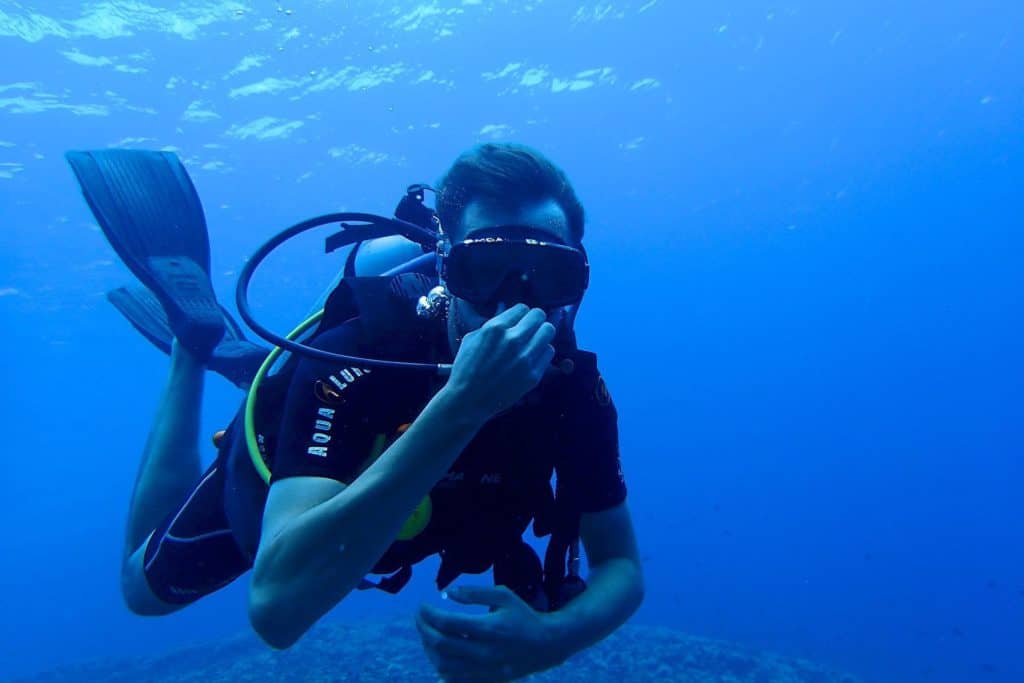
19. Be Alert Of Your Guide and Buddy Whereabout
You may be tempted to follow the back of the trail of the gentle turtle or eye-catching fishes while diving.
Just like what Dory did in the Finding Nemo movie- she followed the bright light, got separated from Marlin, and experienced the unnecessary roller-coaster emotional rides.
So to prevent that from happening in real life (or to yourself), be alert of your diving guide and buddy’s whereabouts as you dive.
Just follow your guide’s instructions and never stray away from your group, even if you are intrigued by the unique marine creatures.
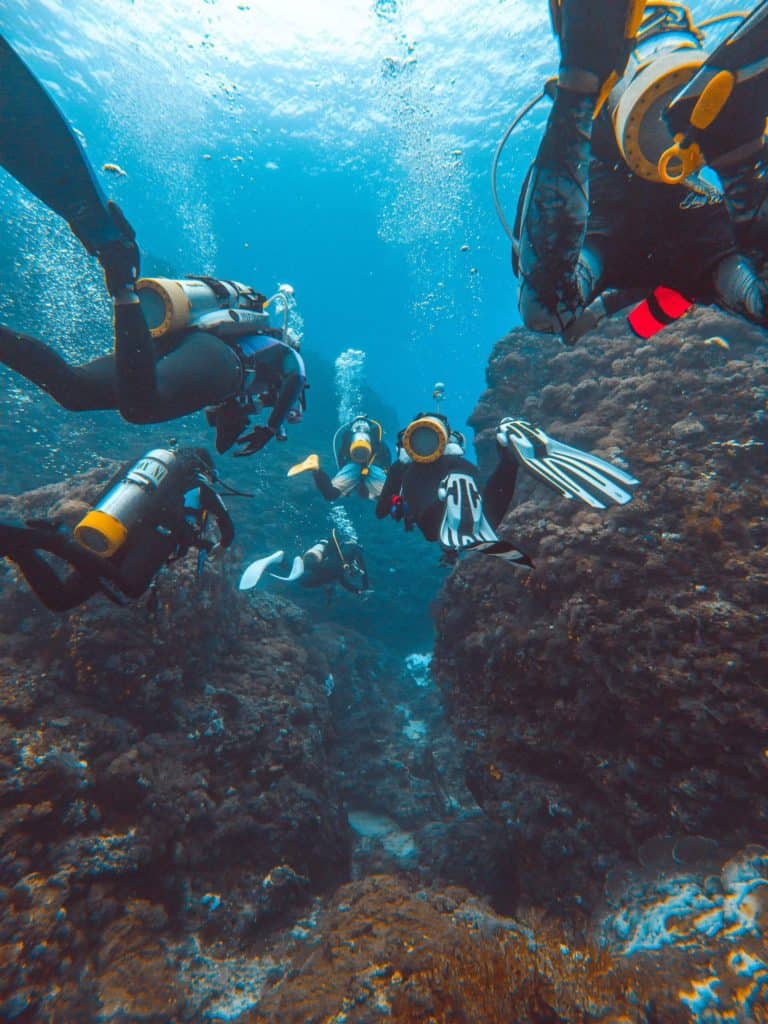
20. Take Note Of Your Air Gauge
Apart from the dive buddy, your oxygen tank is your other important best friend when diving.
You wouldn’t want to leave your exhilarating diving session midway due to low oxygen levels.
Not to mention the danger that you might face especially when you are scuba diving at a higher depth.
So take note of this first time scuba diving tips; always look at your air gauge and inform your instructor accordingly.
21. Don’t Dive Over Limits
The scuba diving certification for beginners is typically an Open Water Course. The maximum depth limit for that is 18 metres (60 feet).
If you are keen to descend more than 18 metres, you will need to get another advanced diving certification.
22. Wear Reef-Friendly Sunscreen
When you are diving in tropical destinations such as Thailand, Malaysia, and Hawaii, don’t forget to apply a generous layer of sunscreen before getting into the water.
Opt for reef-friendly sunscreen options so that the chemicals will not harm the reef.

23. Be Careful Of Marine Creatures
Though unlikely, you might bump into large marine creatures like sharks while scuba diving.
When that happens, you need to stop moving and keep your arms to the body.
Also, be careful not to hit the precious coral reefs during the dive.
Some of the cute-looking sea life could be poisonous or potentially dangerous too, so it is best not to touch any marine creatures as you dive.
Looking for attention-grabbing captions for your diving photos? Check out my 261 captions for scuba diving article for some inspirations!
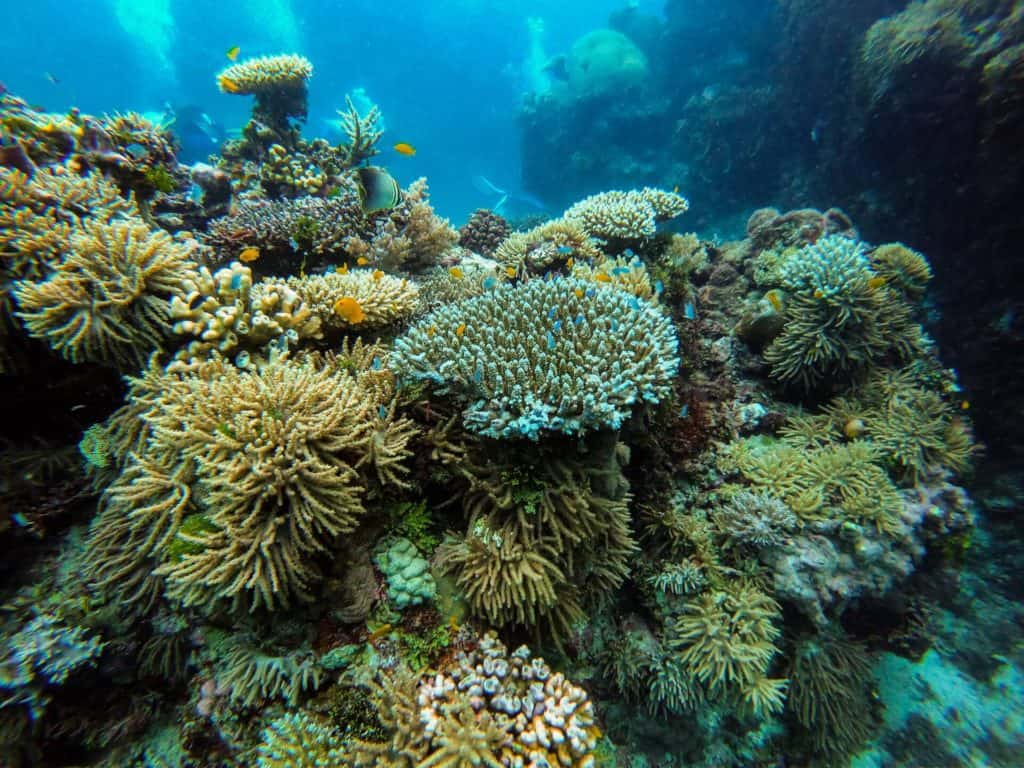
24. Breathe Slowly
Among the very first scuba diving tips for beginner that you learn from the dive school is to breath slowly while diving.
Aside from keeping you calm, slow breathing aids in buoyancy and saving more air in the tank so that your dive can last longer.
You can learn several basic breathing techniques before diving.
25. Stay Calm and Relax
Scuba diving in the big sea or lake offers a whole lot of different experiences and feelings as compared to swimming in the pool.
Depending on the diving site, chances are, you might not be able to see the bottom of the site.
And that can feel scary to some people initially, and that includes me too.
So among the best scuba diving tips for beginners that you can follow is to stay calm and relax while diving.
Just focus on the bright side like enjoying the serene coral reef view or mingling with the cute schools of fishes.
26. Don’t Compare With Others
There are times when you might be grouped with experienced diving enthusiasts on a diving trip.
Instead of being competitive and comparing your speed or diving skills with others, just keep calm and dive at your own pace.
With that, you can immerse yourself in stunning undersea surroundings and have a memorable dive experience.
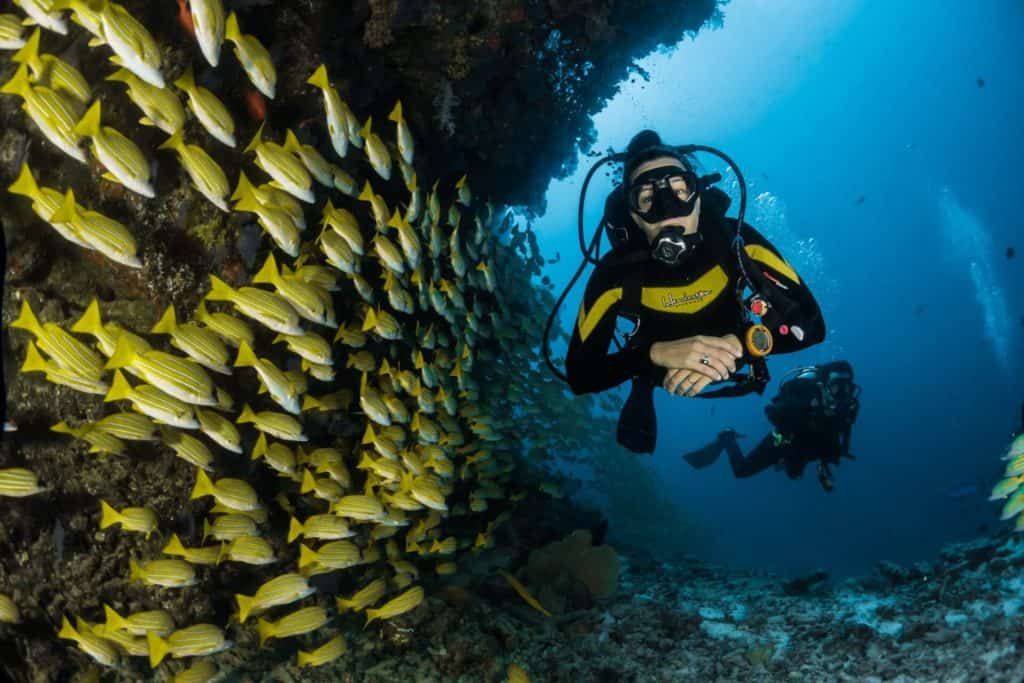
27. Don’t Overstretch Yourself
When you are new to diving, chances are you are still not familiar with the diving site or the basic diving skills.
Therefore, don’t overstretch yourself and just follow the instructions given by the instructor.
If you need to ascend due to exhaustion, make sure to signal to your dive buddy first.
28. Ascend Slowly From The Dive
Another unmissable scuba diving beginner tip to take note of is to ascend slowly from the dive.
A quick ascend can lead to a major injury, such as decompression illness.
When you ascend quickly, the large amount of nitrogen seeps into the tissue and subsequently into the bloodstream, forming a bubble.
Depending on the affected site, the diver may experience numbness, vomiting, or loss of consciousness.
29. Debrief With The Guide and Buddy
You might want to go straight to the shower room and have a nice bath after the tiring yet fun diving adventure.
And that’s not what you should be doing.
Have a debrief session with your diving guide and buddy to learn about the things that got wrong during the dive.
With that, you can take note of and improve the said aspects for the upcoming diving session.
30. Inform Others If You Are Not Feeling Well
If you are not feeling well after scuba diving for the first time, the worst thing that you can do is to keep it to yourself or brush it off.
Make sure to inform your dive buddy or instructor about your current condition.
The experienced instructor will know what to do and offer the right advice to overcome the issue.
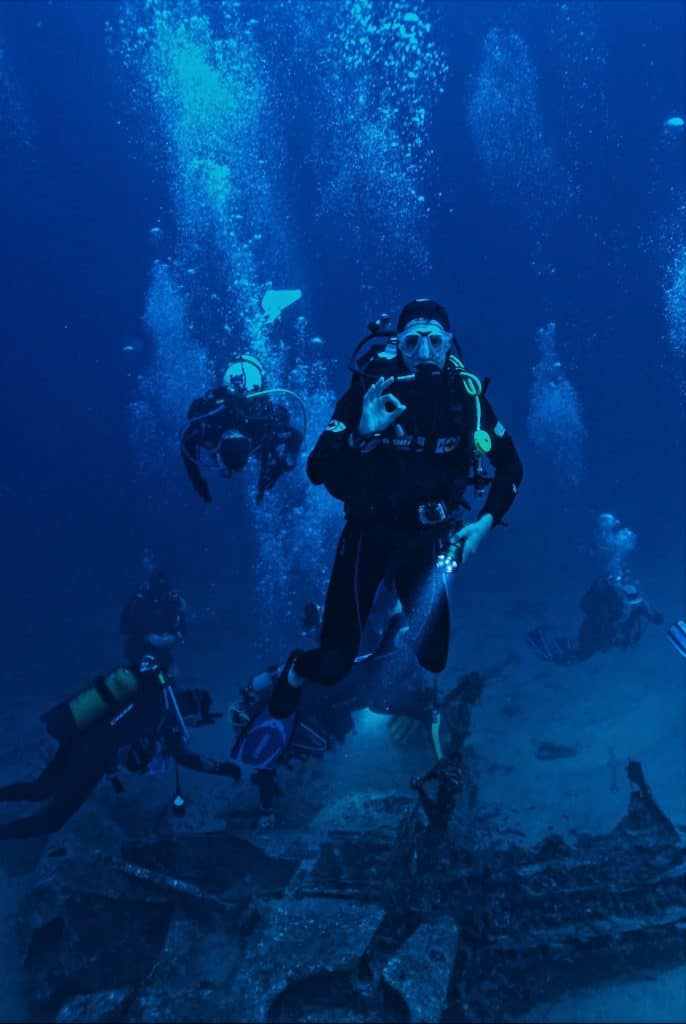
31. Keep A Dive Log
Keeping a dive log is also among the top scuba diving tips for beginners.
A dive log is where you jot down the diving site’s condition, air consumption, your achievement, etc.
Aside from taking note of the location that you have been to for a diving adventure, you can also refer to your dive log as a valuable source to have a more pleasant experience in the upcoming diving session.

Tip: A dive log can be an excellent gift to your fellow diving enthusiasts too!
32. Take Great Care Of Your Gears
Increase your gear’s lifespans by taking great care of them after each dive.
For example, make sure to wash your scuba diving suit with clean water and dry it thoroughly. After that, keep the suit in a cool environment and away from the harsh sunlight.
The same goes for your dive booties, scuba hood, diving gloves, etc.
Check out this great video on how to wash, dry, and store your neoprene wetsuit:
33. Wait For At Least 24 Hours Before Flying
I save the very best scuba diving tip for beginner for the last (because this shocked me the most when I first learned about it); to wait for a minimum 24 hours before pack your luggage and board the plane and fly off.
Diving is one of the interesting hobbies that you can pick up, and with every hobby comes the risk.
When you are planning your diving trip, make sure to cater for an additional day to stay at a diving location or wait for at least 24 hours before flying.
This is to allow excess nitrogen to dissipate, preventing the risk of getting decompression illness.
FAQs: Scuba Diving Beginner Tips
1. Is scuba diving difficult for beginners?
As one of the adventurous outdoor activities, scuba diving is the top few water sports that are easy to learn. Only three foundation skills are used as you swim around the sea creatures and admire the stunning underwater scenery: floating, kicking, and breathing.
2. How do I prepare for my first scuba diving?
- Get Your Scuba Diving Certification From Certified Centre
- Listen To Dive Briefing
- Ask Questions
- Familiarise Yourself With Being In The Water
- Ensure You Are Fit to Dive
- Get Yourself Scuba Diving and Travel Insurances
- Bring Along A Dry Bag
- Rent The Diving Gears First
- Look For Reference Points
- Tie Your Long Hair Neatly
- Go Scuba Diving In A Small Group
- Take Seasickness Pill
- Skip Alcoholic Drinks
- Keep Hydrated
- Use A Menstrual Cup When Having Menstruation
- Do Pre-Dive Gear Check
- Never Hold Your Breath When Diving
- Learn To Clear Your Ears
- Be Alert Of Your Guide and Buddy Whereabout
- Take Note Of Your Air Gauge
- Don’t Dive Over Limits
- Wear Reef-Friendly Sunscreen
- Be Careful Of Marine Creatures
- Reduce Air Consumption
- Stay Calm and Relax
- Don’t Compare With Others
- Don’t Over Exert Yourself
- Ascend Slowly From The Dive
- Debrief With The Guide and Buddy
- Inform Others If You Are Not Feeling Well
- Keep A Dive Log
- Take Great Care Of Your Diving Gear
- Wait For At Least 24 Hours Before Flying
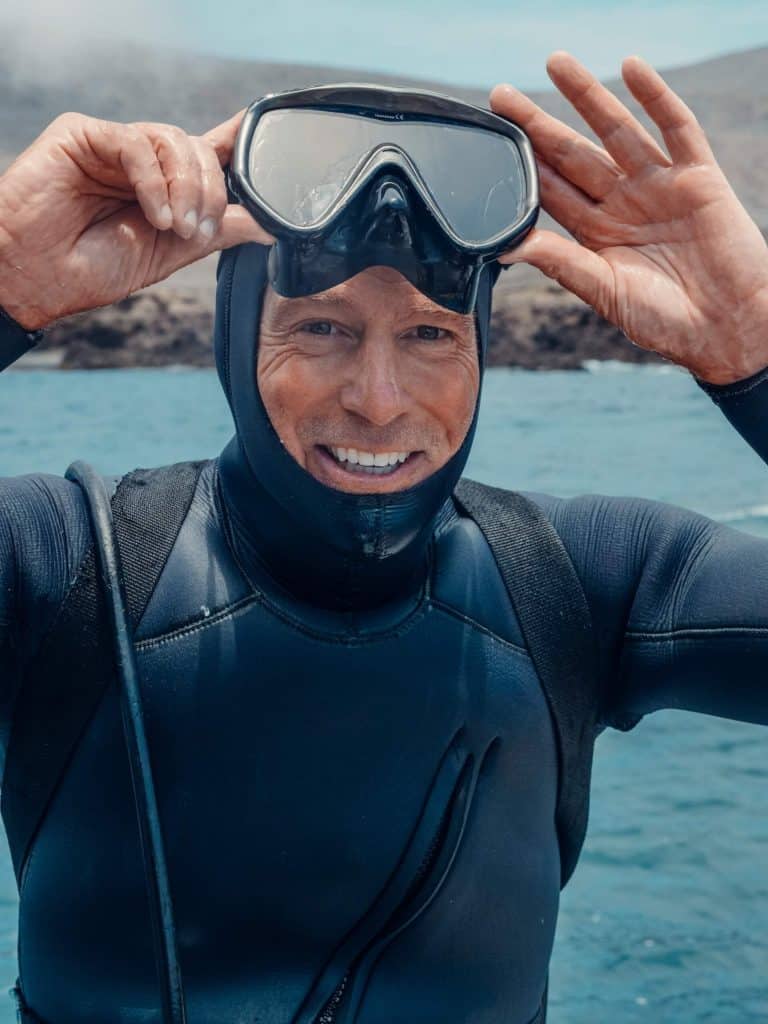
3. What should you not do before scuba diving?
Below lists out a few things that you should stay away from before going for a dive:
- Oily food
- Spicy meals
- Heavy, filling food, like cooked red meat
- Tropical fruits with high acidity, including pineapple and orange
- Skip high water-content fruits especially when you are experiencing stomach discomfort
4. What is the most important rule when scuba diving?
The most important scuba diving rule is not to hold your breath.
That’s because this action can lead to severe injury and death. If you hold your breath when scuba diving, particularly when you ascend, the sudden shift in pressure inside the lungs can damage the lung walls.
5. Beginner Scuba Diving Depth: How Far Can You Go?
For beginner scuba diving courses like Open Water Certification, the maximum depth is 18 metres (60 feet). The diving depth for another beginner diving introduction course, Try Dive, is capped at 12 metres (40 feet).
6. Scuba Diving Materials: What Are The Gears You Need
Below shows the list of the basic and optimal scuba diving gear for a diving trip:
Scuba Diving Gear List (Basics)
Optional Scuba Diving Accessories (Advanced)
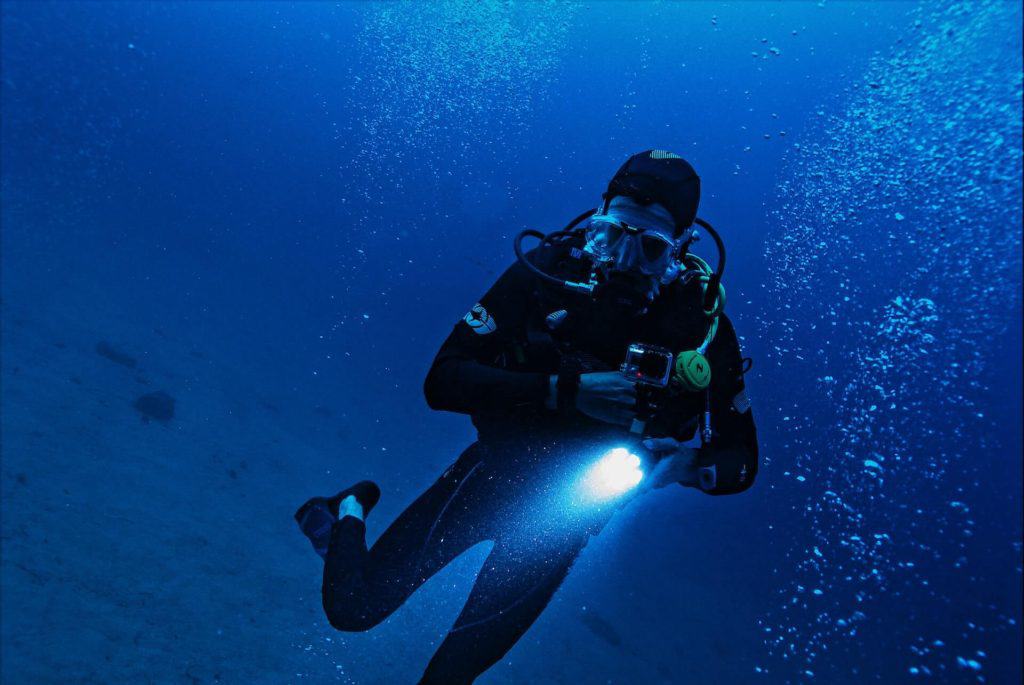
And That Is How You Scuba Dive Safely As Beginner
And there you go; the 33 crucial scuba diving tips for beginners to follow for a pleasant diving session!
Ask questions to your dive master if you have any questions. Concentrate when the dive brief is shared. Keep yourself hydrated. Pop seasickness pill. Conduct a pre-dive check with your dive buddy. Breathe slowly underwater. Ascend slowly to the surface, among any other.
Though your first official dive can seem daunting, you are most likely to have a safe dive by going through the diving notes and beginner diving tips several times.
You will be so proud of yourself by following the diving guidelines and tips and having a successful dive.
You will have a lovely exposure to the underwater world and can’t wait to share your extraordinary experience with your loved ones.
Of all, you will feel accomplished for achieving this big milestone and are ready to take on anything that might come your way.
So let’s get your diving wetsuit ready and hit the water!

Sam Lee, founder of Sam Lee Travel, is a seasoned traveler with over 10 years of experience exploring various Asian countries. Having lived in Singapore for almost a decade, Sam has developed a deep understanding of the culture, customs, and attractions in the region.
With a passion for outdoor travel adventures and water sports, Sam has helped over 25K readers per month plan their trips around Asia, including off-the-beaten-path destinations, offering helpful travel tips and unfiltered personal travel experience.
